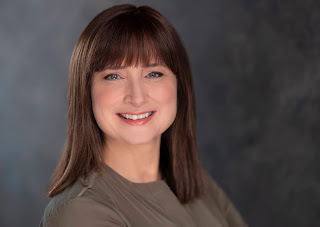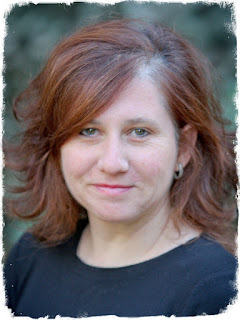Dr. Erica Brown
![]()
Dr. Erica Brown is
the director of the Mayberg Center for Jewish Education and Leadership and an
associate professor of curriculum and pedagogy at The George Washington
University. Erica has a daily podcast, “Take Your Soul to Work” and is the
author of twelve books on leadership, the Hebrew Bible and spirituality. Her
latest book Esther: Power, Fate and Fragility in Exile (Maggid) was a finalist
for the National Jewish Book Council award. She has been published in the New
York Times, The Atlantic, Tablet, First Things, and The Jewish Review of Books
and wrote a monthly column for the New York Jewish Week. She has blogged for
Psychology Today, Newsweek/Washington Post’s “On Faith” and JTA and tweeted on
one page of Talmud study a day at DrEricaBrown. Erica was a Jerusalem Fellow,
is a faculty member of the Wexner Foundation, an Avi Chai Fellow and the
recipient of the 2009 Covenant Award for her work in education.
Erica enjoys conducting interviews and moderating panels to get to know writers, thinkers and opinion makers and has been called the “Terry Gross of the Jewish world.” She has interviewed former Secretary of State Madeline Albright, David Brooks, Jeffrey Goldberg, David Gregory, Moshe Halbertal, Shai Held, Leon Wieseltier, Yehuda Mersky, Ruth Messinger, Sarah Hurwitz, David Makovsky, Dennis Ross, Deborah Lipstadt and others.
Erica has degrees from Yeshiva University, University of London, Harvard University and Baltimore Hebrew University. She previously served as the scholar-in-residence at both The Jewish Federation of Greater Washington and the Combined Jewish Philanthropies of Boston and as the community scholar for the Jewish Center of New York. She currently serves as a community scholar for Congregation Etz Chaim in Livingston, NJ. Erica is also the author of Jonah: The Reluctant Prophet, Take Your Soul to Work: 365 Meditations on Every Day Leadership and Happier Endings: A Meditation on Life and Death (Simon and Schuster), which won both the Wilbur and Nautilus awards for spiritual writing. Her previous books include Inspired Jewish Leadership, a National Jewish Book Award finalist, Spiritual Boredom, Confronting Scandal and co-authored The Case for Jewish Peoplehood (All Jewish Lights). She also wrote Seder Talk: A Conversational Haggada, Leadership in the Wilderness, In the Narrow Places and Return: Daily Inspiration for the Days of Awe (All OU/Koren).
1. What was a
place, person or event that transformed your ideas, thinking, or perspective?
When I went to my
first NCSY Shabbaton and saw a different life path before me, it was the
beginning of many small and incremental changes in behavior and attitude that
led to a very significant transformation of my life and the trajectory of my
family.
2. If you could
broadcast a short message across every social media, TV channel and radio in,
what would you say?
Stop trying to reach more people with social media and building platforms and resumes. It doesn't make you interesting. It makes you shallow. Look inward long and hard and deep. And spend the time with ideas and with other people instead.
3. How has failing to achieve a goal prepared you for the next challenge?
I am not
afraid of failure because I've failed so much. When you write a lot, you
get rejected a lot. And you learn resilience from that rejection. It
hurts. But I am in this for the long haul so I give myself a day to
recover and then try again.
4. If you were to give advice to your younger self, what would it be?
Enjoy the moment
more, cook and eat more slowly, spend more time talking to friends and less
time working.
5. What is one way that you spoil yourself a little?
I read a great deal
of poetry, fiction and memoir in addition to reading that I do for my
professional life. It enables me to travel to worlds very unlike my own. I also
work out every day. It's hardly spoiling myself because it's hard work, and
unlike some people who love to exercise, I don't. But I recognize, even more so
with age, that Hakadosh Barukh Hu put my soul in a body and that body has to be
tended to every day so that it can house my neshama for as long as I'm here.
6. How do you get back on track if you have had an unproductive or distracted
period?
I sit down
and get to work without the expectation that I will be
inspired or inspiring every day, only that a certain body of work will get
done each day. Discipline for me is always about what you do every day - and
then you find that some of those days you do teach well, write well, parent
well and take pleasure in the work.
7. What’s the best or worst piece of advice you ever received?
I don't like
to think of things in best or worst terms, but I would say that a piece of
advice I have followed and have passed on is to assume positive intent. I see
this not only as a religious mandate but as deeply instrumental in
effective leadership.
8. What do you consider as your biggest achievement in the last 5-10 years?
Becoming a
grandmother. On one level, that is not my "achievement."
It is a gift that God and my children blessed us with. But on another level, the
long-term investment we made in our Jewish lives and in our children combined
in the most remarkable way in the faces of our grandchildren. That's our
contribution to Jewish continuity quite literally.
9. What area do you
see that people in your profession do not stress enough?
As a teacher, I
think people spend much more time on content than they spend on pedagogic
techniques to communicate ideas and checking in with their learners to
see what they are thinking, absorbing and questioning. Honestly, there are
way too many Torah teachers who lecture as if there is no one in the room with
them or it could be anyone. That's not real education. That's either
entertainment or satisfying one's own ego needs. Teaching is rarely about
the teacher. It must be all about the student.
10. What part of Jewish learning is your main focus or favourite? How would you
recommend people to get more deeply into it?
I love the act of
close, slow reading no matter the text. I love seeing cross references and
the intertextuality of what I am studying. That makes me feel real
reverence for the material. I recommend finding a teacher who lights up the
room and sit in her or his presence for a long time.
11. I have often thought that we in the modern orthodox community are walking a
tightrope between different worlds both of which we want to belong to and be
active in which may detract from our full attention to one or the other
particularly to the Jewish side. Can you give some ideas or direction how to
connect more deeply to the Torah and Hashem? (Books, ideas, programmes,
activities)
Connecting with God
is dependent on our own capacity for gratitude, vulnerability and a healthy
sense of our insignificance. The Modern Orthodox movement has continuously
stressed finding God in texts and tefilot, in books and in
sanctuaries. Why limit God to those places and spaces? For this experiment
to really work, we need to see God in each other, in the tender interactions
among people at times of joy and grief.




Comments
Post a Comment